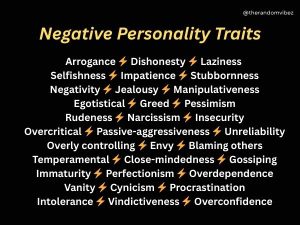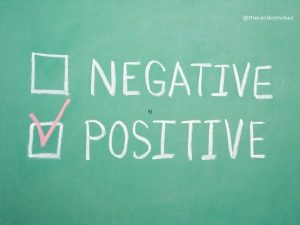Human beings are a mix of strengths and flaws. While positive qualities like empathy, honesty, and resilience help us build trust and success, our negative personality traits—the darker patterns of behavior—can quietly sabotage our happiness.
These are the bad traits that show up in daily life as arrogance, dishonesty, selfishness, or laziness. Left unchecked, they damage careers, strain relationships, and erode self-worth.
✅The good news? By identifying these bad attributes in a person, we can actively work on self-improvement and build healthier connections.
✅Negative traits aren’t just random flaws—they’re patterns of behavior that shape how others perceive us and how we experience life. Left unaddressed, they can quietly erode trust, self-confidence, and opportunities.
✅But when we recognize and work on them, they become stepping stones toward growth. In other words, learning about these traits isn’t about judgment—it’s about creating space for awareness, compassion, and transformation.
📌What Are Negative Personality Traits?
✅Negative personality traits are deeply ingrained behaviors, attitudes, or patterns that negatively affect an individual’s personal development and social interactions.
⚠️These negative traits can manifest as bad personality signs such as arrogance, dishonesty, or selfishness, and they often prevent people from reaching their full potential.
💡💡For example, arrogance pushes people away, dishonesty destroys trust, and laziness kills ambition.
⚠️When ignored, these traits can become destructive habits that define how others perceive us. Recognizing them is the first step toward change.

📌50+ Common Negative Personality Traits
Here’s a comprehensive list of bad personality signs that often affect relationships, careers, and overall well-being:
- Arrogance – Excessive pride and lack of humility.
- Dishonesty – Habitual lying or deceitful behavior.
- Laziness – Avoiding responsibility and lacking motivation.
- Selfishness – Prioritizing one’s own needs above others.
- Impatience – Struggling to wait calmly or handle delays.
- Stubbornness – Refusal to adapt or compromise.
- Negativity – Always focusing on the worst outcomes.
- Jealousy – Resentment toward others’ success or happiness.
- Manipulativeness – Using others for personal gain.
- Egotistical – Obsessed with their own importance.
- Greed – An insatiable desire for more, often at others’ expense.
- Pessimism – Constantly expecting failure or disappointment.
- Rudeness – Lack of respect or courtesy toward others.
- Narcissism – Extreme self-importance and lack of empathy.
- Insecurity – Constant self-doubt that affects confidence.
- Overcritical – Excessively judging or criticizing others.
- Passive-aggressiveness – Indirect resistance or hostility.
- Unreliability – Failing to keep promises or commitments.
- Overly controlling – Dominating situations and people.
- Envy – Wanting what others have with resentment.
- Blaming others – Refusing to take accountability.
- Temperamental – Easily angered or emotionally unstable.
- Close-mindedness – Refusing to consider other perspectives.
- Gossiping – Talking negatively behind others’ backs.
- Immaturity – Childish reactions to adult situations.
- Perfectionism – Unrealistic standards causing stress for self and others.
- Overdependence – Relying too much on others.
- Vanity – Excessive concern with appearance and image.
- Cynicism – Distrusting others’ motives or sincerity.
- Procrastination – Delaying important tasks unnecessarily.
- Intolerance – Lack of acceptance of differences.
- Vindictiveness – Holding grudges and seeking revenge.
- Overconfidence – Believing one is always right.
- Apathy – Lack of interest or concern for important matters.
- Cold – Lacks warmth and emotional connection.
- Irresponsibility – Ignoring duties and obligations.
- Insensitive – Lacks empathy or consideration for others’ feelings.
- Overindulgence – Excessive pursuit of pleasure or comfort.
- Impoliteness – Disregarding manners or basic respect.
- Hypocrisy – Saying one thing but doing another.
- Obstinacy – Unreasonably refusing to change one’s opinion.
- Carelessness – Lack of attention or consideration in actions.
- Dependency – Inability to function without constant support.
- Hostility – Displaying aggression or animosity toward others.
- Overdramatic – Exaggerating situations for attention.
- Forgetfulness – Regularly neglecting responsibilities or commitments.
- Argumentativeness – Constantly provoking disputes.
- Overanxiousness – Excessive worry that paralyzes decision-making.
- Overtalkativeness – Dominating conversations without listening.
- Recklessness – Acting without considering consequences.
- Overpossessiveness – Clinging tightly to people or things.
- Unforgiving nature – Refusing to let go of past wrongs.
- Overindependence – Rejecting help even when necessary.
- Superficial – Shallow person lacking depth.
These negative character qualities not only hurt personal growth but can also destroy trust, reduce career opportunities, and create emotional distance in relationships.

📌How Toxic Traits in People Affect You
Being around someone with negative personality traits can be mentally exhausting, emotionally draining, and socially challenging.
⚠️Traits like arrogance, selfishness, or manipulativeness often make interactions tense, leaving you second-guessing yourself or feeling undervalued.
⚠️Over time, constant exposure to negativity—such as pessimism, gossiping, or aggressiveness—can erode your confidence, increase stress levels, and even impact your own behavior.
⚠️In relationships, these traits can cause misunderstandings, resentment, and emotional distance, while in professional settings, they can reduce collaboration, hinder productivity, and create a toxic environment.
⚠️Essentially, negative traits don’t just affect the person who has them—they ripple outward, influencing everyone around them and shaping the energy and dynamics of any group or interaction.
📌Real-Life Impact of Negative Traits
- In the workplace, arrogance, laziness, and gossiping ruin teamwork.
- In friendships, jealousy, selfishness, and unreliability strain bonds.
- In relationships, dishonesty, hostility, and possessiveness create toxicity.
For example, an impatient manager may push employees too hard, while a selfish partner erodes trust in a relationship. These traits rarely appear in isolation—they often combine, making their impact stronger.
📌Why Negative Traits Develop
Negative personality traits rarely appear out of nowhere—they often arise from childhood experiences, upbringing, life incidents, or trauma. Understanding these roots can help us approach personal growth with awareness and compassion. Here are several examples:
- ⚠️Overcritical or harsh parenting can lead to traits like insecurity, perfectionism, or overcritical behavior, as children learn to judge themselves and others harshly.
- ⚠️Neglect or lack of attention during childhood can manifest as attention-seeking, dependency, or selfishness later in life.
- ⚠️Experiencing bullying or rejection can contribute to hostility, cynicism, jealousy, or social withdrawal.
- ⚠️Overprotective parenting can result in fear of failure, overdependence, or avoidance of responsibility.
- ⚠️Childhood trauma, abuse, or sudden loss can give rise to anger issues, emotional instability, or trust issues in adulthood.
- ⚠️Parental favoritism or constant comparison with siblings may fuel competitive behavior, resentment, or arrogance.
- ⚠️Growing up in a chaotic or unpredictable environment can create anxiety, overcautiousness, or compulsive control tendencies.
- ⚠️Witnessing or experiencing injustice may lead to vindictiveness, cynicism, or pessimism.
- ⚠️Early exposure to excessive criticism or unrealistic expectations can result in self-doubt, low self-esteem, or overcritical tendencies toward others.
By recognizing that many negative traits are learned or conditioned, we can replace blame with understanding and adopt strategies to transform these behaviors into healthier patterns.
📌How to Overcome Negative Personality Traits
Confronting bad traits isn’t easy, but it’s entirely possible. Here are proven strategies:
- Self-Reflection – Journaling and mindfulness reveal toxic thought patterns.
- Seek Feedback – Honest input from friends, mentors, or colleagues can uncover blind spots.
- Build Emotional Intelligence – Learn empathy, active listening, and emotional regulation.
- Set Clear Goals – Replace destructive habits with positive ones.
- Therapy or Coaching – Professionals can guide you through deeper behavioral changes.
“You cannot have a positive life and a negative mind.”– Joyce Meyer

Conclusion
Negative personality traits don’t define your entire identity—they are simply habits and patterns that can be changed. Recognizing them is not a sign of weakness but of courage, because self-awareness is the foundation of growth.
⚡Think of this process as an ongoing journey. You may not eliminate every bad attribute in a person, but with effort, you can reduce their influence and replace them with healthier behaviors.
⚡Each small shift—choosing patience over anger, honesty over deceit, empathy over selfishness—reshapes the way others see you and the way you see yourself.
⚡Ultimately, the goal isn’t to be perfect, but to evolve. By addressing your negative traits and transforming them into strengths, you create a more authentic, resilient, and fulfilling life.
FAQ’s: Negative Personality Traits
Q: What is a negative personality trait?
A: Negative character traits are patterns of behavior or attitudes that can create conflict or harm in relationships and everyday life. They reveal aspects of a person that are often self-centered, harmful, or unhelpful—such as arrogance, dishonesty, laziness, impatience, or rudeness. Recognizing these traits helps in understanding and managing interactions with others.
Q: What are common red flags in people?
A: Common red flags include dishonesty, manipulativeness, excessive jealousy, arrogance, and hostility. These traits can indicate toxic behavior that may harm your personal or professional relationships.
Q: How can I recognize negative traits in someone early?
A: Look for patterns like controlling behavior, constant criticism, gossiping, lack of accountability, or repeated negativity. These behaviors often appear consistently over time, not just occasionally.
Q: What are subtle bad traits in people?
A: Subtle signs include passive-aggressiveness, sarcasm used to undermine, frequent self-centeredness, or avoidance of responsibility. These traits may be easy to miss but can erode trust over time.
Q: Can people with negative traits change over time?
A: Some traits can improve with self-awareness, therapy, or life experiences. However, deeply ingrained behaviors often persist unless consciously addressed. Recognizing these traits early helps you set healthy boundaries.
Q: What are the big three negative personality traits?
A: The “Dark Triad” refers to three of the most harmful personality traits:
- Narcissism (excessive self-importance, entitlement, lack of empathy),
- Machiavellianism (manipulativeness, deception, willingness to exploit others),
- Psychopathy (lack of remorse, impulsivity, antisocial behavior)
are traits strongly linked to toxic behavior in both personal and professional settings.